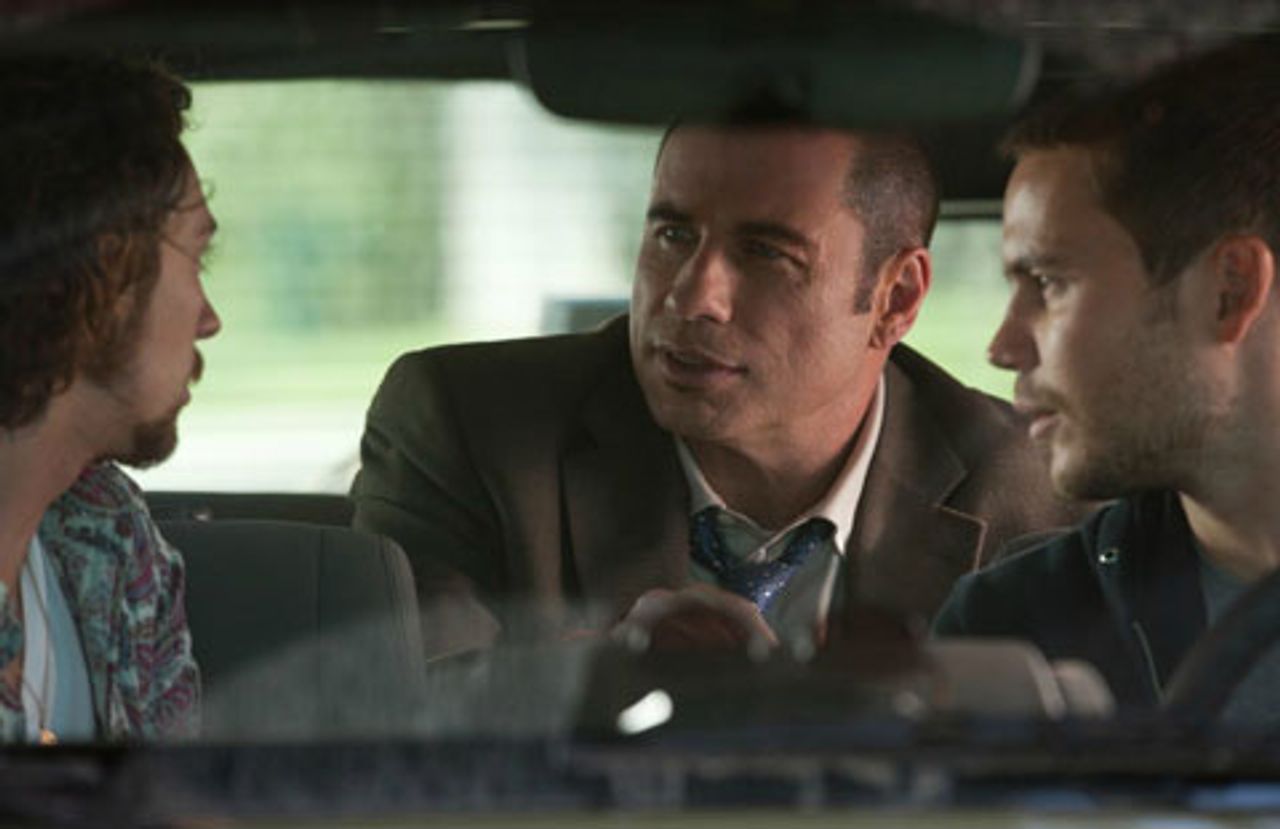Directed by Oliver Stone, written by Stone, Shane Salerno, Don Winslow, based on a novel by Don Winslow
 Savages
SavagesFor his latest film Savages, director Oliver Stone has set his sights on the “war on drugs.” Stone imagines the consequences of escalating violence in the United States, as drug cartels from Mexico begin to exert a greater influence across the border. The film is an adaptation of the 2010 novel of the same title, written by Don Winslow.
Best friends Chon (Taylor Kitsch) and Ben (Aaron Johnson) are wealthy marijuana growers and dealers in California. Chon is a disturbed veteran of the wars in Iraq and Afghanistan, while Ben is more easygoing and devotes much of his time to participating in international charity work. They share a girlfriend, Ophelia (Blake Lively), who prefers to go by the diminutive “O.” She narrates the film in a voiceover.
The drug dealing ménage à trois lead a relatively sunny existence in the affluent community of Laguna Beach until they are approached by a rival drug gang from Mexico. The Baja Cartel, led by Elena Sánchez (Salma Hayek) is preparing a hostile takeover of the California dealers’ operations. Ben likens it to Wal-Mart coming to town, ruining a small neighborhood business. The terms set out by Elena’s cartel are anything but favorable to the young men’s own business interests.
When Chon and Ben decide to reject the cartel’s offer and flee to Indonesia, Elena sends her sadistic henchman Lado (Benicio Del Toro) to kidnap O and force the young men to cooperate. With O in Elena’s clutches, Chon convinces Ben to go to war with the Mexican cartel. Armed with information provided by a corrupt DEA agent (John Travolta) and aided by Chon’s ex-Navy Seal friends, the two attempt to bring down the cartel and rescue O. The violence escalates as retaliation follows retaliation.
Savages is a bombastic work, loud and vulgar. It rushes by before one’s eyes at an almost manic pace. There is little room for reflection by the audience. Everything but the kitchen sink is thrown in. There’s the Iraq War, the debate over legalization of marijuana, the promotion of small local business over larger chains like Wal-Mart. All of it treated superficially, if not merely in passing.
The characters themselves are eclectic creations. One struggles to understand how this or that character trait fits with the others. Anyone and everyone seems capable of almost anything.
While promoting the film, Stone has been very vocal in his love of marijuana and various hallucinogenic drugs. The film is designed, at least in part, as an argument for their legalization. He has a certain romantic attachment to the growers and dealers he has met in California while researching the film (the “beautiful savages,” as O refers to them). Their violence, their sex, their drugs become a source of fascination, the central focus of the work.
In the past, Stone’s approach has allowed him to capture the frenzy of extreme situations, as evidenced by the anti-Vietnam War films Platoon and Born on the Fourth of July (and, in its own flawed way, Wall Street) with some success. But how penetrating is his overall attitude to life? What does it amount to in the end?
Savages, like far too many of Stone’s films, does little to enlighten us. It is a work largely content with remaining on the surface of things. Stone will show us in relatively graphic detail all the ways in which the human body can be torn apart by guns or by torture. However, he can tell us next to nothing about social life, of what truly set those bodies in motion, so to speak.
If Stone really wanted to make a film about the “war on drugs,” or the increasing violence which it has produced, why focus only on the violent acts of rival gangs? Where is the role of the US or Mexican government? They exist only on the margin of Stone’s film, if that.
The heavily militarized drug war, funded with billions of dollars from the US, has produced a catastrophe in Latin America. Tens of thousands have been killed in Mexico alone since President Felipe Calderón began his push for a greater crackdown on drug cartels in 2006.
US authorities have used the war on drugs as a pretext to assert its dominance throughout the region for reasons that have nothing to do with combating drug use or protecting the population from the threat of gang violence. Inside the US, which has the highest level of illegal drug use in the world (according to the World Health Organization), the so-called war on drugs has allowed for the ramping up of police forces and powers throughout the country. The prosecution and criminalization of those suffering from a social and medical disaster, targeting some of the most vulnerable and oppressed layers of society, has contributed greatly to making the United States’ incarceration rate the highest in the world.
In recent years, connections between major US financial institutions and cartels in Mexico have also come to light. In 2010 it was revealed that Wachovia Bank, acquired by Wells Fargo in 2008, had laundered $378.4 billion (!) for the notorious Sinaloa Cartel over a period of three years. The bank avoided prosecution by agreeing to pay a mere $160 million in fines.
To ignore all of this, along with the broader social processes that contribute both to widespread drug use and the development of parasitical gangs like the Baja Cartel, is to make a film largely beside the point. Romanticizing the outlaw culture of parasitical entrepreneurs like Chon and Ben does no one any good at all.
